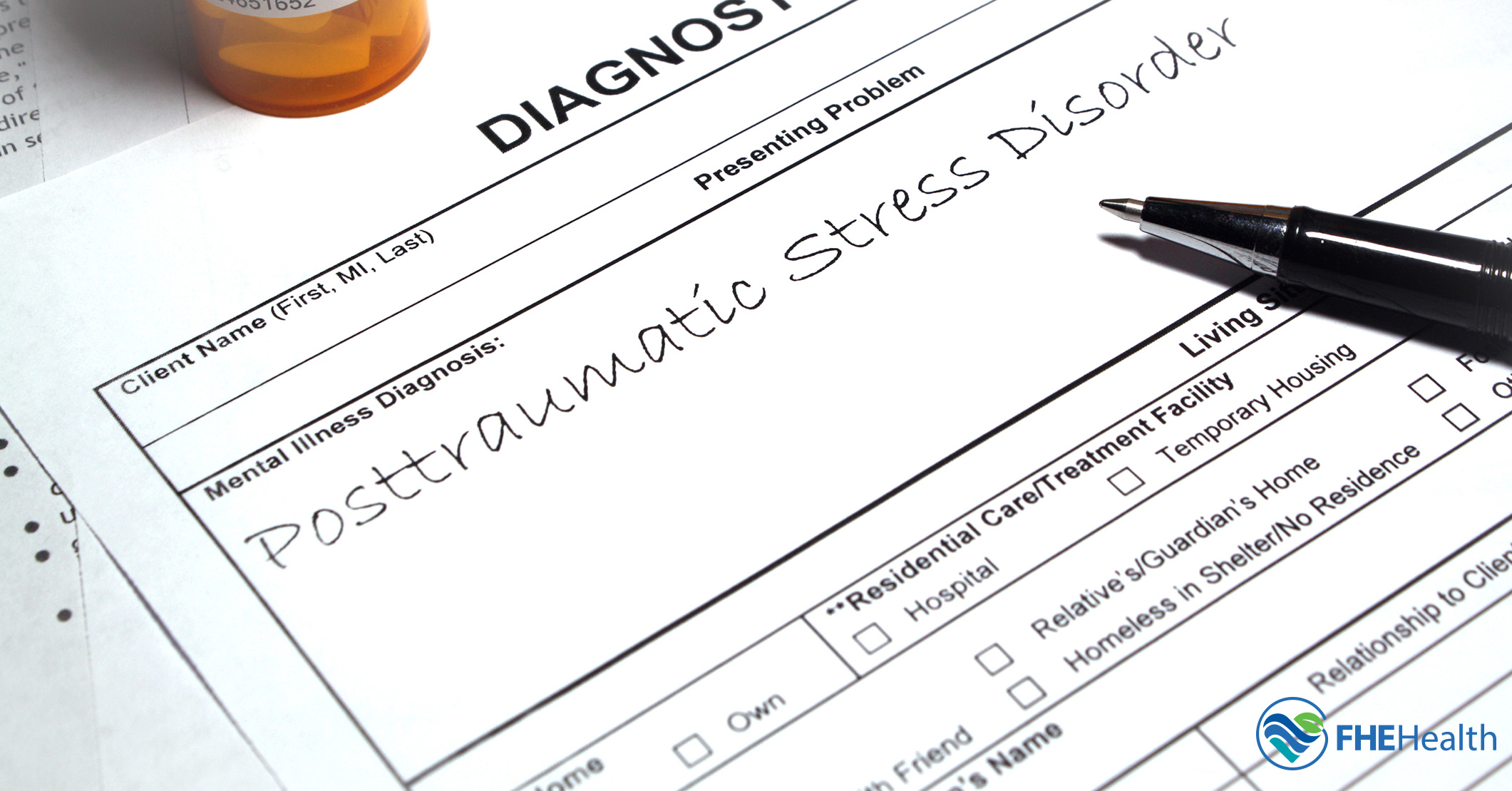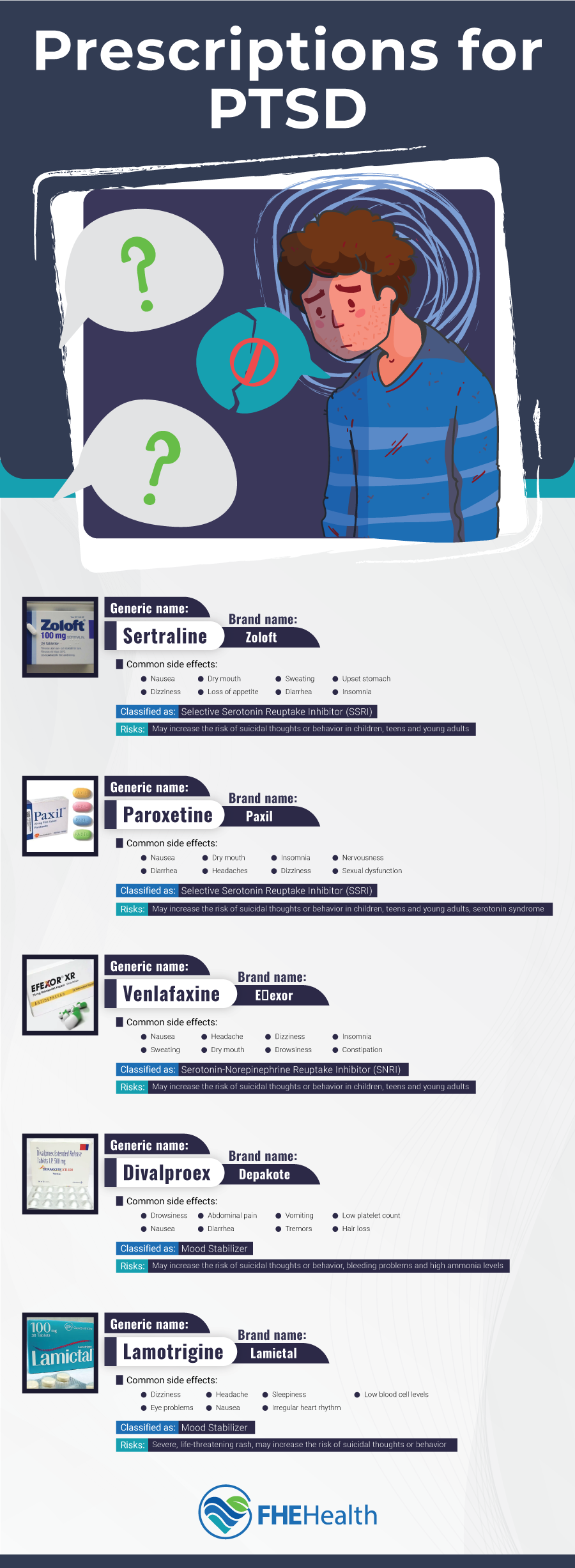
Post-traumatic stress disorder (PTSD) is a mental health condition that comes from experiencing or witnessing a traumatic event, causing intense flashbacks, anxiety and depression. Without proper treatment, PTSD can negatively affect your day-to-day life, making it difficult to go to work or school and maintain interpersonal relationships. However, medication can help alleviate these symptoms before they completely disrupt your life. Keep reading to understand the antidepressant list available for treating PTSD and how these medications can aid in trauma recovery.
Understanding PTSD Symptoms
According to the U.S. Department of Veteran Affairs, about 5% of the American population struggles with PTSD in any given year. Some people experience PTSD symptoms within a month of the traumatic event, while others aren’t affected until years later. Regardless of when symptoms start, they can be disruptive to your daily life and last for months or years. Symptoms can vary but typically include:
- Flashbacks or nightmares
- Trouble sleeping
- Feeling worried, sad or guilty
- Losing interest in pleasurable activities
- Difficulty concentrating
- Physical pain such as stomachaches or headaches
- Avoiding people, places or situations associated with the traumatic event
- Angry outbursts
- Feeling alone or detached from others
- Startling easily
- Negative beliefs about yourself or others
- Severe anxiety or irritability
- Depression
The Role of PTSD Meds in Treatment
If you’ve been diagnosed with PTSD, professional treatment can help you process your trauma and regain control of your life. Often, a combination of psychotherapy and medication can help you successfully manage symptoms and understand how your trauma impacts your thoughts, feelings and behaviors.
During psychotherapy, your therapist can help you develop stress-management skills to better cope with negative or stressful situations. Depending on the severity of your symptoms, a therapist may suggest medication. Choosing the best medication for PTSD is a collaborative process in which you and your therapist will monitor side effects and see which drug improves your situation the most.
You may need to try various drugs, dosages or medication schedules before finding the most effective treatment solution. Although it can be a lengthy process, finding the right combination of therapy and medication offers benefits such as:
- Teaching you skills to address symptoms
- Learning healthier coping mechanisms if symptoms worsen again
- Helping you gain a more positive perspective of yourself, others and the world
- Treating other conditions commonly linked with PTSD, such as anxiety, depression or substance abuse
Antidepressant List for Treating PTSD
If you decide medication is the right path, your health care provider may present a PTSD medicine list based on your symptoms. You may be prescribed one medication or a combination of drugs. Your doctor will also routinely check in to discuss side effects and see if the medication is working. There are two main categories of drugs you may be prescribed.
Selective Serotonin Reuptake Inhibitors (SSRIs)
The first medications on the antidepressant list for PTSD are SSRIs, the most common drug category used to treat depression. These medications work by increasing serotonin levels in the brain. Serotonin is a neurotransmitter that carries signals between brain cells to improve your mood and decrease feelings of anxiety.
SSRIs make more serotonin available to improve communication between neurons by blocking its reabsorption into neurons. Currently, sertraline (Zoloft) and paroxetine (Paxil) are the only two SSRIs approved by the Food and Drug Administration (FDA) to treat PTSD. Possible side effects of SSRIs include:
- Nausea, vomiting or diarrhea
- Dry mouth
- Headaches
- Restlessness or insomnia
- Dizziness
- Drowsiness
- Nervousness or agitation
- Sexual dysfunction
- Changes in appetite, resulting in weight gain or loss
SSRIs can reduce symptoms of anxiety and depression associated with PTSD, improving your sleep, concentration and interest in everyday or pleasurable activities.
Serotonin-Norepinephrine Reuptake Inhibitors (SNRIs)
People who don’t respond to SSRIs may be prescribed SNRIs instead. SNRIs are primarily used to treat depression but are sometimes used for other conditions, such as anxiety disorders or chronic pain. They work by producing more serotonin and norepinephrine in the brain, improving communication between brain cells and boosting your mood.
Similar to SSRIs, SNRIs block the reabsorption of serotonin and norepinephrine in the brain. They’re believed to help PTSD symptoms by putting these brain chemicals back in balance, helping with mood regulation to relieve feelings of depression. Possible side effects of SNRIs include:
- Dry mouth
- Dizziness
- Nausea
- Excessive sweating
- Headache
- Insomnia
- Tiredness
- Constipation
- Loss of appetite
- Sexual dysfunction
Other Medications Used for PTSD
Although antidepressants are the most common drugs used for treating PTSD, your doctor may prescribe other medications if you don’t respond to antidepressants or have symptoms requiring alternative treatment. If your main symptoms are anger, irritability or agitation, you may be prescribed a mood stabilizer.
Commonly used to treat bipolar disorder and personality disorders, mood stabilizers work by balancing brain chemicals that regulate emotions. They help reduce mood swings and prevent depressive or manic episodes, especially if you have a coexisting mood disorder; side effects can include vomiting, nausea and drowsiness. It’s important to note that mood disorders differ from personality disorders, which involve long-standing patterns of thought, feeling, and behavior.
If you’re experiencing persistent anxiety that prevents you from performing everyday activities, your doctor may prescribe an antianxiety medication. These drugs work by calming the central nervous system to provide short-term relief from anxious feelings.
While SSRIs and SNRIs can alleviate anxiety, benzodiazepines are the most common type of antianxiety medication. However, they’re typically prescribed for short-term treatment or to be taken only as needed due to their high potential for misuse. Common side effects can include drowsiness, dizziness, confusion and unsteadiness.
Seeking Support for PTSD
Whether you decide to take medication, attend therapy or both, it’s important to understand you won’t get better overnight. While professional treatment can help you process your trauma and alleviate your symptoms, it’s a gradual change, requiring time and effort to help you successfully move forward. However, the sooner you seek treatment, the sooner you can overcome PTSD and regain control of your life.
You don’t have to process your trauma alone. FHE Health will work with you to help you overcome unresolved trauma and determine which course of treatment best aligns with your needs. Contact us today to learn how our services can help you move forward in a healthy, positive way.







